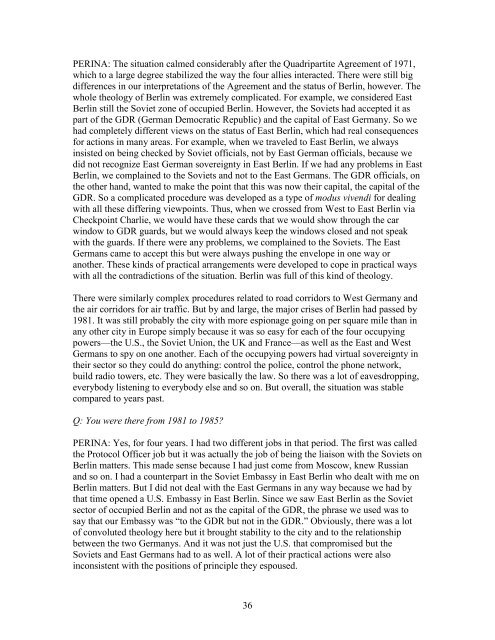ambassador rudolf v. perina - Association for Diplomatic Studies and ...
ambassador rudolf v. perina - Association for Diplomatic Studies and ...
ambassador rudolf v. perina - Association for Diplomatic Studies and ...
Create successful ePaper yourself
Turn your PDF publications into a flip-book with our unique Google optimized e-Paper software.
PERINA: The situation calmed considerably after the Quadripartite Agreement of 1971,<br />
which to a large degree stabilized the way the four allies interacted. There were still big<br />
differences in our interpretations of the Agreement <strong>and</strong> the status of Berlin, however. The<br />
whole theology of Berlin was extremely complicated. For example, we considered East<br />
Berlin still the Soviet zone of occupied Berlin. However, the Soviets had accepted it as<br />
part of the GDR (German Democratic Republic) <strong>and</strong> the capital of East Germany. So we<br />
had completely different views on the status of East Berlin, which had real consequences<br />
<strong>for</strong> actions in many areas. For example, when we traveled to East Berlin, we always<br />
insisted on being checked by Soviet officials, not by East German officials, because we<br />
did not recognize East German sovereignty in East Berlin. If we had any problems in East<br />
Berlin, we complained to the Soviets <strong>and</strong> not to the East Germans. The GDR officials, on<br />
the other h<strong>and</strong>, wanted to make the point that this was now their capital, the capital of the<br />
GDR. So a complicated procedure was developed as a type of modus vivendi <strong>for</strong> dealing<br />
with all these differing viewpoints. Thus, when we crossed from West to East Berlin via<br />
Checkpoint Charlie, we would have these cards that we would show through the car<br />
window to GDR guards, but we would always keep the windows closed <strong>and</strong> not speak<br />
with the guards. If there were any problems, we complained to the Soviets. The East<br />
Germans came to accept this but were always pushing the envelope in one way or<br />
another. These kinds of practical arrangements were developed to cope in practical ways<br />
with all the contradictions of the situation. Berlin was full of this kind of theology.<br />
There were similarly complex procedures related to road corridors to West Germany <strong>and</strong><br />
the air corridors <strong>for</strong> air traffic. But by <strong>and</strong> large, the major crises of Berlin had passed by<br />
1981. It was still probably the city with more espionage going on per square mile than in<br />
any other city in Europe simply because it was so easy <strong>for</strong> each of the four occupying<br />
powers—the U.S., the Soviet Union, the UK <strong>and</strong> France—as well as the East <strong>and</strong> West<br />
Germans to spy on one another. Each of the occupying powers had virtual sovereignty in<br />
their sector so they could do anything: control the police, control the phone network,<br />
build radio towers, etc. They were basically the law. So there was a lot of eavesdropping,<br />
everybody listening to everybody else <strong>and</strong> so on. But overall, the situation was stable<br />
compared to years past.<br />
Q: You were there from 1981 to 1985?<br />
PERINA: Yes, <strong>for</strong> four years. I had two different jobs in that period. The first was called<br />
the Protocol Officer job but it was actually the job of being the liaison with the Soviets on<br />
Berlin matters. This made sense because I had just come from Moscow, knew Russian<br />
<strong>and</strong> so on. I had a counterpart in the Soviet Embassy in East Berlin who dealt with me on<br />
Berlin matters. But I did not deal with the East Germans in any way because we had by<br />
that time opened a U.S. Embassy in East Berlin. Since we saw East Berlin as the Soviet<br />
sector of occupied Berlin <strong>and</strong> not as the capital of the GDR, the phrase we used was to<br />
say that our Embassy was “to the GDR but not in the GDR.” Obviously, there was a lot<br />
of convoluted theology here but it brought stability to the city <strong>and</strong> to the relationship<br />
between the two Germanys. And it was not just the U.S. that compromised but the<br />
Soviets <strong>and</strong> East Germans had to as well. A lot of their practical actions were also<br />
inconsistent with the positions of principle they espoused.<br />
36
















